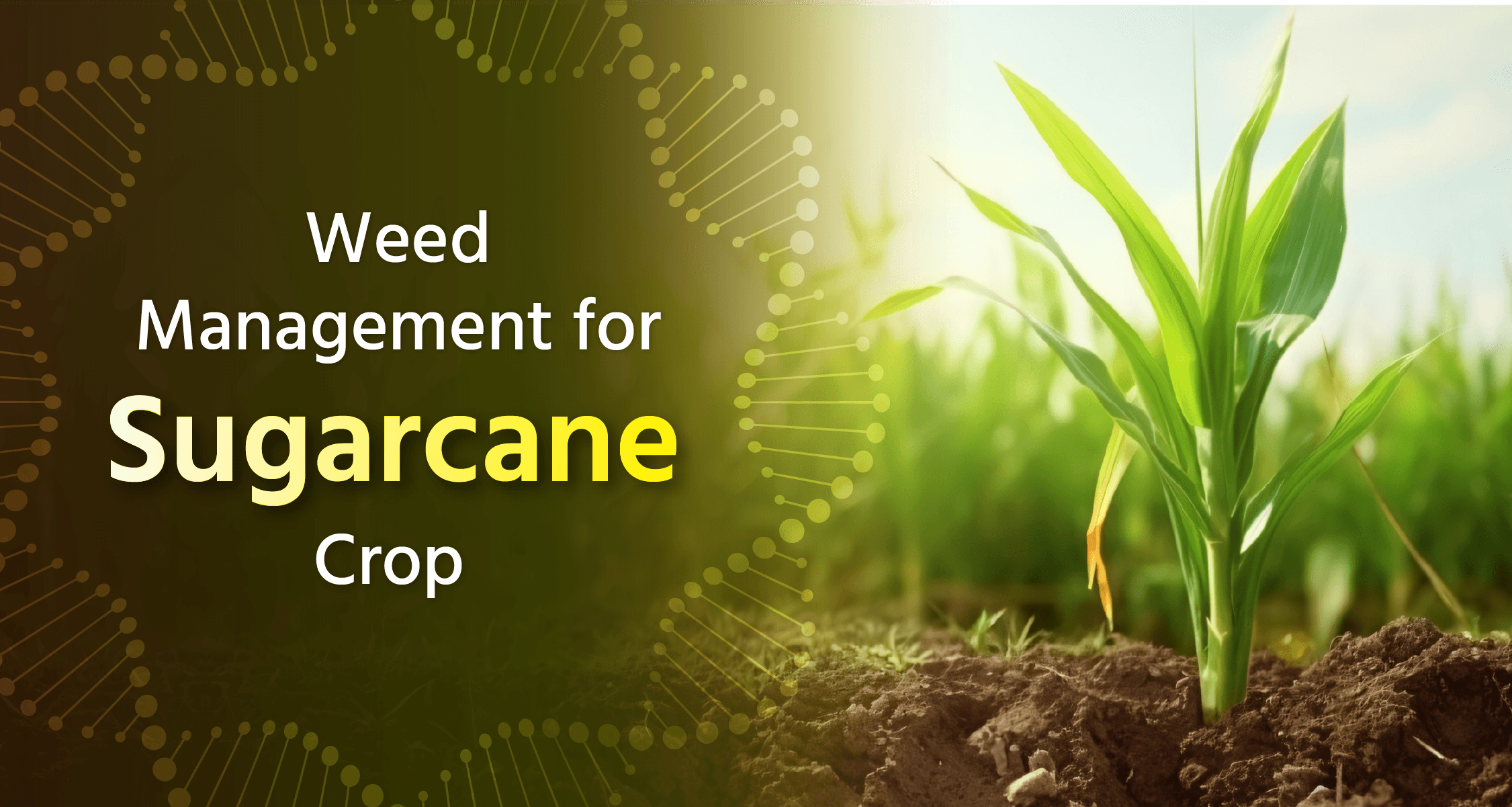Post Details
Weed Management for Sugarcane Crop

Sugarcane is an essential part of the Indian agricultural industry, primarily cultivated for producing jaggery and sugar. Its production boosts prosperity, employment, and the economy. However, the presence of weeds can directly impact the economic well-being of farmers. To achieve a good yield of sugarcane, it is crucial to address weed issues effectively. Through this post, let’s dive into detailed information on weed management in sugarcane.
Damage Caused by Weeds in Sugarcane Cultivation
- Reduced Growth: Weed infestations in sugarcane crops slow down growth, potentially leading to lower yields for farmers.
- Decrease in Sweetness: Weeds can reduce the sweetness of sugarcane, affecting the production of jaggery and sugar.
- Reduction in Yield: Weed damage can cause up to a 40% decrease in sugarcane yield.
- Increased Disease and Pest Incidence: Weeds contribute to the spread of various diseases and pests in sugarcane crops, posing challenges to crop protection.
- Economic Loss: Decreased yield and quality can result in financial losses for farmers.
- Increased Costs: Using herbicides raises agricultural costs, and additional expenses arise from using various treatments to control pests and diseases.
Various Methods of Weed Control in Sugarcane
Hand Weeding and Hoeing
- To control weeds, the first weeding and hoeing can be done 20 to 25 days after sowing the crops.
- The second weeding can be carried out 40 to 45 days after sowing or as needed.
- Weeding and hoeing not only nourish the crop effectively but also help in eliminating the problem of weeds.
Chemical Control
- Before the germination of sugarcane, apply 400-1,600 grams of Atrazine 50% WP (Tata Rallis Atrataf, Dhanuka Dhanuzine) per acre in the field.
- Before the emergence of weeds, apply 1 kilogram of Clomazone 22.5% + Metribuzin 21% WP (FMC Austral) per acre in the field.
- 25 days after sowing, apply 36 grams of Halosulfuron Methyl 75% WG (Dhanuka Sempra) per acre in the field.
- 25 days after sowing, apply 1 kilogram of Amethrin 80% WDG (Adama Tamar) per acre in the field.
- If broadleaf weeds are an issue in the sugarcane crop, apply 600 grams of 2,4-D Sodium Salt 80% WP (Dhanuka Weedmar) per acre in the field, 25 days after sowing.
Things to Keep in Mind While Using Herbicides
It’s essential to keep a few important points in mind when applying weed control sprays:
- Avoid Repeated Use of the Same Herbicide: Using the same weedicide repeatedly can make weeds tolerant or resistant to it.
- Limit Use to One Application per Crop Cycle: Apply chemical weedicides only once during a crop cycle.
- Read and Follow Instructions: Carefully read and follow the instructions on the weedicide packaging.
- Ensure Adequate Moisture in the Soil: The soil should not lack moisture, allowing the weedicide to reach the crop effectively.
- Apply the Correct Amount: Spray the weedicide in the correct quantity to prevent any adverse effects on the crop.
- Avoid Mixing with Other Pesticides or Fungicides: Mixing pesticides or fungicides with weedicides can reduce the effectiveness of the weedicide.
- Avoid Overuse: Excessive use of weedicides, which contain harmful chemicals, can harm the soil and environment.
- Use Silicone-Based Sticker with Herbicide: Silicone-based stickers enhance the effectiveness of the weedicide. The required sticker amount depends on factors like area, rainfall, plant age, and crop type.
- Recommended Quantity: Use 40 ml of a silicone-based sticker (e.g., IFC Super Sticker) per acre.
What methods do you use to control weeds in your sugarcane crop? Share your answers with us in the comments. For more information on weed control, follow the 'Weed Management' channel right away. Also, don’t forget to like this post and share it with other farmers!
Frequently Asked Questions (FAQs)
Q: How to control weeds in sugarcane?
A: Intercropping with sugarcane can be beneficial for farmers to control weeds, as it reduces empty spaces in the field, limiting weed growth. Weeding by hand can also help control weeds. If weeds are excessive, chemical herbicides can be used.
Q: What precautions should be taken while spraying herbicides?
A: Herbicides contain various harmful chemicals that can adversely affect human health. Therefore, while spraying herbicides, cover your face properly with a cloth and wear gloves. After spraying, wash your hands thoroughly. Empty herbicide packets can be harmful to animals, so avoid discarding them carelessly.
Q: What are some common broadleaf weeds?
A: Some prominent broadleaf weeds include White Goosefoot, Senji, Milkweed, Wild Spinach, Wild Peas, etc. These weeds are prevalent in almost all regions of India.
Q: How is weeding done?
A: Weeding is done to control weeds growing in the field. Tools like a hand hoe, spade, or harrow are used for this process, where weeds are either uprooted or cut close to the soil's surface. This method requires significant time and labor, so it is more commonly used in small fields than large ones.
Q: When should herbicide spraying be done?
A: Spraying of herbicides should be done in the morning or evening. Ensure that the soil has adequate moisture at the time of spraying.
Please login to continue

Get free advice from a crop doctor
